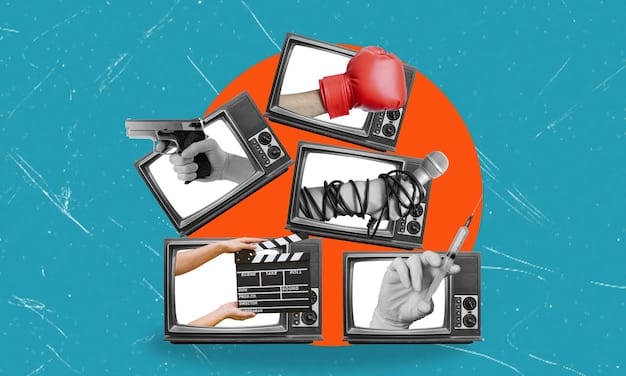Cancel Culture in 2025: New Battlegrounds & Future Trends

Cancel culture in 2025 is evolving, not fading, shifting from broad social media outrage to more targeted campaigns with complex, less-predictable battlegrounds including AI-driven reputation management and decentralized social platforms, presenting both challenges and opportunities for public discourse and accountability.
Is cancel culture in 2025: Is it fading or evolving, and what are the new battlegrounds for public shaming? A question debated across digital platforms and academic circles alike, the dynamics of public shaming continue to shift, raising questions about accountability, justice, and the future of online interaction. Let’s delve into how these trends are evolving.
Future of Accountability: Is Cancel Culture Fading?
The narrative around cancel culture often swings between declarations of its demise and warnings of its continued prevalence. However, a nuanced perspective suggests that it isn’t simply fading but rather morphing into new forms.
Instead of disappearing, cancel culture is adapting to societal shifts, technological advancements, and evolving attitudes toward public accountability.
Evolving Definitions of Accountability
Accountability is no longer confined to immediate public outcry. It’s expanding to include broader implications for personal and professional lives.
The Role of Generational Shifts
Younger generations approach cancel culture with varying degrees of skepticism and acceptance, shaping its future trajectory depending on their ever adapting value systems.
- Gen Z Skepticism: Many Gen Z individuals question the effectiveness and fairness of cancel culture, advocating for restorative justice approaches.
- Millennial Perspectives: Millennials often view cancel culture as a necessary tool for holding power structures accountable, though they remain cautious of its potential for abuse.
- Differing Values: Generational disparities in values and communication styles contribute to the evolving understanding and application of cancel culture.
As accountability standards evolve and generational perspectives shift, cancel culture’s impact becomes more complex and unpredictable.

New Arenas for Public Shaming
The traditional boundaries of social media no longer contain the scope of public shaming. New platforms and technologies are emerging as key battlegrounds.
These new battlegrounds present unique challenges and opportunities for both those being shamed and those driving the shaming.
Decentralized Social Platforms
Platforms promoting free speech may become hotbeds for uncensored shaming, complicating moderation efforts.
AI-Driven Reputation Management
The use of AI tools to manage online reputations can both mitigate and exacerbate the effects of cancel culture, creating ethical dilemmas.
- Reputation Laundering: AI tools can be used to bury negative information and rehabilitate online personas.
- Algorithmic Bias: AI algorithms may perpetuate existing biases, leading to unfair or disproportionate shaming.
- Ethical Considerations: The use of AI in reputation management raises questions about authenticity and transparency.
The proliferation of decentralized platforms and AI-driven reputation management tools is reshaping the landscape of public shaming, introducing new complexities and ethical considerations.
The Impact of Misinformation and Disinformation
The spread of false or misleading information can amplify cancel culture’s effects, leading to unjust targeting and severe consequences.
Combating misinformation and disinformation requires a multi-faceted approach involving media literacy, fact-checking, and platform accountability.
The Role of Deepfakes
Deepfake technology can create realistic but fabricated content, making it difficult to discern truth from falsehood and potentially ruining lives.
Echo Chambers and Polarization
Online echo chambers reinforce existing beliefs, making individuals more susceptible to misinformation and contributing to increased polarization.

The proliferation of misinformation and disinformation poses a significant threat, necessitating proactive measures to promote media literacy and combat the spread of false narratives.
The Legal Ramifications of Online Shaming
Online shaming can have legal consequences, including defamation, harassment, and incitement to violence. Understanding these ramifications is crucial for both victims and perpetrators.
Navigating the legal landscape of online shaming requires expertise in defamation law, cyber harassment laws, and free speech protections.
Defamation and Libel
False statements that harm someone’s reputation can lead to defamation lawsuits, requiring proof of damages and malicious intent.
Cyber Harassment and Stalking
Online harassment and stalking can result in criminal charges and civil lawsuits, especially when they involve threats or repeated unwanted contact.
- Legal Recourse: Victims may seek restraining orders or pursue legal action against perpetrators.
- Platform Responsibility: Online platforms have a responsibility to address and prevent cyber harassment.
- Consequences for Perpetrators: Perpetrators may face criminal charges, civil penalties, and reputational damage.
The legal ramifications of online shaming underscore the importance of responsible online behavior and awareness of legal rights and obligations.
Strategies for Navigating Cancel Culture
Individuals and organizations can adopt proactive and reactive strategies for navigating the complex landscape of cancel culture. These strategies include reputation management, crisis communication, and fostering a culture of empathy and understanding.
Effective navigation requires a combination of preparation, responsiveness, and commitment to ethical communication.
Proactive Reputation Management
Building a strong online presence and engaging in transparent communication can mitigate the impact of potential controversies.
Crisis Communication Planning
Developing a crisis communication plan allows individuals and organizations to respond quickly and effectively to public shaming incidents.
- Immediate Response: Addressing concerns promptly and transparently can help contain the damage.
- Empathy and Acknowledgment: Acknowledging the impact of actions and expressing empathy can diffuse anger.
- Commitment to Change: Demonstrating a commitment to learning and improving can restore trust and credibility.
By adopting proactive and reactive strategies, individuals and organizations can better navigate the challenges of cancel culture and protect their reputations.
Promoting Constructive Dialogue
Fostering open and respectful dialogue is essential for addressing complex social issues and finding common ground.
Constructive dialogue requires active listening, empathy, and a willingness to engage with diverse perspectives.
The Importance of Empathy
Empathy fosters understanding and encourages individuals to consider the impact of their words and actions on others.
Creating Safe Spaces for Discussion
Establishing safe spaces for open and honest discussion can promote understanding and bridge divides.
Promoting constructive dialogue is essential for fostering a more tolerant and understanding society, where diverse perspectives are valued and respected.
| Key Point | Brief Description |
|---|---|
| 🔥 Evolving Accountability | Accountability now includes personal and professional implications beyond immediate outcry. |
| 🌐 New Arenas | Decentralized platforms and AI are new battlegrounds for public shaming. |
| ⚠️ Misinformation Impact | Misinformation amplifies cancel culture, leading to unjust targeting. |
| ⚖️ Legal Consequences | Online shaming can lead to defamation, harassment, and incitement to violence. |
FAQ
▼
Cancel culture involves public online shaming that results in boycotts and reputational damage impacting someone’s life. Originally it was focused on accountability but has evolved to incorporate misinformation and sometimes disproportionate responses.
▼
AI is used both to manage online reputations and spread disinformation, which can either mitigate or exacerbate the effects of cancel culture. This introduces ethical concerns over authenticity and fairness.
▼
Legal issues include cyber harassment, defamation, and potential incitement to violence. Victims can pursue legal action, and platforms must address harassment.
▼
Strategies include proactive reputation management, crisis communication planning, and embracing empathy to handle concerns transparently, showing commitments to change can help resolve concerns.
▼
Fostering respect and creating safe spaces are important. Empathy encourages individuals to reflect on their actions, promoting more understanding and positive interactions.
Conclusion
As cancel culture persists and reshapes, understanding its modern battlegrounds—propelled by both innovative tech and generational evolution—becomes ever more crucial. By addressing the underlying concerns, learning to combat misinformation, and committing to empathetic and transparent communication, our society can progress toward a sustainable, just and genuinely tolerant digital environment.





